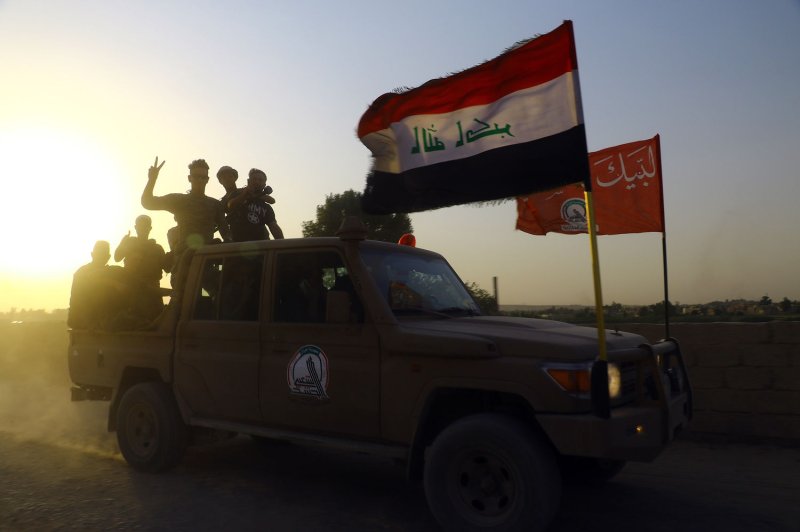1 of 9 | Iraq's federal police members wave Iraq's victory signs as they celebrate in the Old City of Mosul on July 10, 2017 after the government's announcement of the "liberation" of the embattled city. Iraq declared victory against the Islamic State group in Mosul on July 9 after a months-long campaign, dealing the biggest defeat yet to the jihadist group. Photo by Hana Noori/UPI |
License Photo
July 9 (UPI) -- After months of fighting, the Iraqi army officially recaptured Mosul, pushing the last pockets of Islamic State resistance from the city.
On Sunday, Iraqi Prime Minister Haider al-Abadi declared the army's victory over the militant group -- also identified as Daesh, ISIS and ISIL -- in the northern Iraq city.
According to multiple earlier reports, an official declaration of victory had been expected. Only a small group of IS fighters remain holed up in small section of Mosul's Old City.
The prime minister, dressed in military garb, greeted and congratulated Iraqi soldiers on their victory.
Over the weekend, the Iraqi army raised the national flag on the bank of the Tigris River in the Old City.
IS first seized Mosul in 2014, but Iraqi forces have been chipping away at jihadist control of the city since October of last year. The siege has been backed by U.S.-led coalition airstrikes, but warplanes have dropped fewer bombs in recent days as Iraqi forces inched closer to retaking the city.
In October, when fighting began, there were roughly 6,000 militants in Mosul. An estimated 300 remain.
Since IS took over the city in 2014, nearly a million civilians have fled the city. And the fighting over the last several months has left the city severely damaged.
Many of the residents who have remained in the city are being found in desperate conditions.
Al Jazeera that many people are malnourished and seriously dehydrated. Some are traumatized by the violence of the war and months of hiding inside their homes.
With Mosul now retaken, many of the displaced civilians are expected to return, putting pressure on the Iraqi government to begin rebuilding the city in haste. Damage among the western half of the city is extensive.
"The damage in the right bank, compared to the left bank is 30 times more," said Nofal al-Hammad, governor of Nineveh, a city located on the outskirts of Mosul. "I mean here the destruction of the city's infrastructure, the houses of the people, and the government offices."
Iraqi forces still have more IS strongholds to take on. The Islamic State remains in control of several towns in Iraq.















